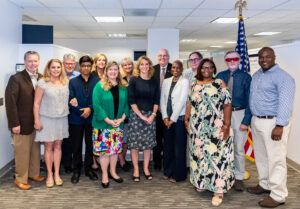RALEIGH — How do you define restorative justice? How does the U.S. Department of Justice (DOJ) define it? It appears the field, in general, does not operate with an agreed definition of restorative justice, nor does it have any specific practices to implement it, according to Caren Harp, administrator of the DOJ’s Office of Juvenile Justice and Delinquency Prevention (OJJDP).
It’s with those issues in mind that Harp has invited Campbell Law Professor Jon Powell, director of the law school’s Restorative Justice Clinic, to join a Restorative Justice (RJ) working group of practitioners and experts in the field to produce a restorative justice guide of sorts — definitions, principles and practices — that can help jurisdictions understand RJ more thoroughly and implement it with fidelity.
“I have the utmost respect for Caren Harp because of her proven leadership in the field of juvenile and criminal justice and I am very grateful to her for starting this initiative,” Powell said. “I am extremely honored to be invited to join leaders in restorative justice from across the country and am committed to bringing the experiences gathered from our work in the Campbell Law School clinic to further the good work of this worthy cause.”
The RJ working group convened for the first time on July 15 in Washington, D.C.

The Restorative Justice Clinic at Campbell Law receives referrals from the juvenile justice system, juvenile court, Wake County Schools and the Capital Area Teen Court program.
The goals of the project are to:
- Give juveniles the opportunity to take responsibility for and become accountable for their actions.
- Give victims the opportunity to learn about and be intimately involved in the outcome of their case.
- Give all parties the opportunity to create an agreement that will address and resolve the harm caused by criminal activity.
- Involve law students in the process of victim/offender mediation as active mediators.
Throughout this mediation process, law students are involved as active co-mediators with trained law school faculty. This clinical experience provides valuable experience to law students in learning ways to approach and resolve problems which occur from criminal activity.
Part of the mission of the Restorative Justice Clinic is to help spread the word of Restorative Justice throughout the state of North Carolina and to assist others in the state in starting Restorative Justice programming. Powell has spoken on many occasions to various groups on the topic of Restorative Justice and has assisted organizations in starting mediation programs based on the Campbell model. Campbell Law School was privileged to host the third National Conference on Restorative Justice in June of 2011 and Powell was the lead planner.
Prior to working with the project, Powell practiced law in Wake and Harnett counties. Powell’s primary focus was in criminal defense with an emphasis on juvenile law. Powell earned his law degree from Campbell University in 1998. Prior to attending law school, Powell worked for Carolina Power and Light Company, during which time he received his B.A. in Communications from North Carolina State University. He is married and has three children.
ABOUT CAMPBELL LAW
Since its founding in 1976, Campbell Law has developed lawyers who possess moral conviction, social compassion, and professional competence, and who view the law as a calling to serve others. Among its accolades, the school has been recognized by the American Bar Association (ABA) as having the nation’s top Professionalism Program and by the American Academy of Trial Lawyers for having the nation’s best Trial Advocacy Program. Campbell Law boasts more than 4,200 alumni, who make their home in nearly all 50 states and beyond. In 2019, Campbell Law is celebrating 40 years of graduating legal leaders and 10 years of being located in a state-of-the-art facility in the heart of North Carolina’s Capital City.

